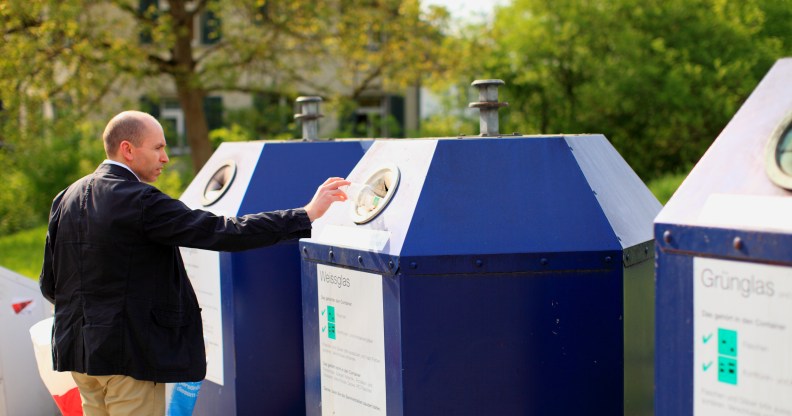Straight men don’t recycle because they are worried it looks gay

A man dropping a glass bottle in a recycling bin. (Svetoslava Slavova/Getty Images)
Straight men will avoid reusable plastic bags and other environmentally-friendly efforts because of harmful gender stereotypes, a new study has suggested.
Researchers found that certain attempts to be more environmentally conscious are often perceived as either masculine or feminine.
Using a reusable shopping bag was labelled a “feminine” act by participants in the study, with both men and women found more likely to question a man’s sexuality if he shopped with a bag for life.
Subjects were also more likely to question a woman’s sexual orientation if she displayed supposedly “masculine” green tendencies, such as caulking windows.
Gender stereotypes could prevent green acts
Janet K. Swim, the Pennsylvania State University psychologist who led the study, said that some people might be put off behaving in a more eco-friendly manner because of these stereotypes.
“People may avoid certain behaviours because they are managing the gendered impression they anticipate others will have of them. Or they may be avoided if the behaviours they choose do not match their gender,” Swim said.
If being seen as heterosexual is important to a person, they may prioritise gender-conforming behaviours.
While participants didn’t explicitly label the subjects who didn’t conform to their gender stereotype as gay or lesbian, Swim said that men who want to be seen as straight might avoid “feminine” actions.
“If being seen as heterosexual is important to a person, that person may prioritise gender-conforming over gender-nonconforming pro-environmental behaviours in anticipation of how others might see them,” Swim said.
“Masculine” women suffer social consequences
For the three-part study, published in the journal Sex Roles, 960 participants were asked to assess whether a fictional character’s actions were “feminine” or “masculine.”
In the final part of the study, researchers asked the participants to rank who they would like to be partnered with from a list including a woman and man who displayed “gender-conforming” green behaviours, and a woman and man who preferred “gender non-conforming” behaviours.
While women preferred the company of other women regardless of their green actions, men were found more likely to avoid women who showed “masculine” traits.
“We were surprised that it was only women who experienced being avoided if they engaged in nonconforming gender-role behaviours,” Swim said.
“We can’t say why this is happening, but it is a social consequence. Women may be experiencing this negative feedback and might not know why.”

